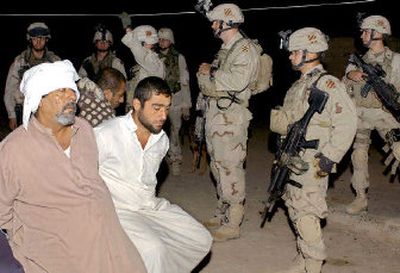U.S. forces aim to retake towns

HADITHA, Iraq – U.S. troops pushed through streets sown with bombs Tuesday in their biggest operation this year in western Iraq, seeking to retake three Euphrates River towns from al-Qaida insurgents. At least five U.S. service members have been killed in the fighting.
Operation River Gate – launched at the start of the holy month of Ramadan – was the second U.S. offensive in a week in Anbar province, near the Syrian border. Al-Qaida in Iraq called for intensified attacks on U.S. and Iraqi forces during the Muslim period of fasting, which started Tuesday for the nation’s Sunnis.
Blasts from U.S. warplanes and helicopters lit up the sky during the fighting, aimed at putting down Sunni-led insurgents intensifying their campaign of violence ahead of an Oct. 15 vote on Iraq’s new constitution.
As with the earlier U.S. offensive it appeared many fighters may have slipped away beforehand.
Late Monday and early Tuesday, some 2,500 U.S. troops along with Iraqi forces launched their operation with a powerful air assault on Haditha, Haqlaniyah and Parwana, about 140 miles northwest of Baghdad.
Dozens of helicopters streamed toward the Euphrates towns in a phalanx, seen by an Associated Press reporter. Rockets fired by choppers flashed in the pre-dawn darkness, followed by explosions and arches of tracer fire.
At least twice, illuminating flares went up over Haqlaniyah – a sign U.S. troops were fighting insurgents on the ground.
American warplanes struck bridges to prevent al-Qaida in Iraq fighters from escaping the towns, but arriving troops encountered dozens of roadside bombs on main avenues, apparently in anticipation of the operation, Marine commanders said.
A single roadside bomb in Haqlaniyah on Monday killed three U.S. service members, apparently among the first ground troops to move in.
U.S. snipers took positions on rooftops in Haqlaniyah as troops with loudspeakers ordered residents to stay inside, witnesses said.
In Haditha, mosque loudspeakers urged residents to confront the Americans, but Marines said they encountered little resistance.
“Some of them may have gotten away. But those that are here, we’ll get them,” said Capt. Shannon Neller, of New York, commander of Lima Company in 3rd Battalion, 1st Marine Regiment.
Troops were concentrating on “systematically clearing” Haditha by doing house-to-house searches and locating bombs planted around town, Neller said.
“A lot of the locals we met were very helpful, and a lot pointed out insurgents or those who had been helping them,” Neller said. At least 11 people were detained.
The earlier U.S. offensive began Saturday, 93 miles upriver by the Syrian border, and continued Tuesday in the towns of Sadah, Karabilah and Rumana. A bomb killed a Marine in Karabilah, the first casualty of that operation.
At least 41 insurgents have been killed, the U.S. military said. But many fighters appeared to have fled before the assault, with the military reporting no major engagements Tuesday.
The deaths in the two operations, along with that of a soldier shot in the western town of Taqaddum, raised to at least 1,940 the number of U.S. service members who have died since the beginning of the Iraq war in March 2003, according to an Associated Press count.
Operation River Gate was notable for the strongest participation this year by Iraqi troops – U.S. commanders said hundreds were involved – at a time of deep concerns about their readiness.
The simultaneous strikes appeared aimed at breaking two insurgent strong points.
The small, isolated towns near the border have been used as way stations for foreign fighters joining the fight. Haditha is also an “an important crossroads” for al-Qaida smuggling of fighters and weapons, the military said.
Together, the Haditha area towns form a larger population center – with more than 100,000 residents – where militants have been operating almost freely after driving out Iraqi security forces with a series of bloody attacks earlier this year.
Twenty Marines and an Iraqi interpreter were killed in Haditha in an ambush and roadside bomb on Aug. 1 and Aug 3. Last spring, a suicide car bombing wrecked Haditha General Hospital, the region’s largest. The U.S. military has said that Iraq’s most-wanted terrorist, Abu Musab al-Zarqawi, head of Al-Qaida in Iraq, once had a home in Haditha.
The new U.S. assault is a “step forward to eliminating insurgents and giving the country back to the Iraqi people,” said Col. Stephen W. Davis, who said it would also help people in the area freely vote Oct. 15.
Insurgent violence has killed at least 237 people, including 21 U.S. service members, in the past nine days ahead of the referendum.
Separately, the leader of an extremist Islamic group that threatened to use chemical weapons against U.S. positions and the Iraqi government has also been killed in Iraq, according to an Internet statement posted Tuesday. Al-Haj Othman, the emir of the Mujahedeen of the Victorious Sect Brigades, was killed in fighting, said the statement. It did not provide any other details.